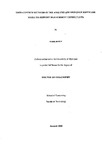USER-CENTRED METHODS IN THE ANALYSIS AND DESIGN OF SOFTWARE TOOLS TO SUPPORT MANAGEMENT CONSULTANTS
| dc.contributor.author | DIXON, MARK | |
| dc.contributor.other | School of Engineering, Computing and Mathematics | en_US |
| dc.date.accessioned | 2013-09-17T13:18:30Z | |
| dc.date.available | 2013-09-17T13:18:30Z | |
| dc.date.issued | 2000 | |
| dc.identifier | NOT AVAILABLE | en_US |
| dc.identifier.uri | http://hdl.handle.net/10026.1/1817 | |
| dc.description.abstract |
The aim of the present work was to investigate the development of improved software tools for management consultants, and to investigate the effectiveness of augmented user-centred methods in this development, and thereby consider the more general use of augmented user-centred methods to develop software tools that support creative human activity systems. The research method used draws from and integrates aspects of user-centred design, soft systems methods, structured systems analysis and design, and software engineering. This includes using user literature, 'thinking aloud' role play observations, and interviews to develop a user model of the management consultancy process; using literature of related disciplines (qualitative data analysis and social network analysis), literature of existing computer assisted management consultant software tools, and formative iterative prototyping, empirical user testing and heuristic evaluation to synthesise a general design rationale of software tools for management consultants; and using empirical user testing and a subjective user acceptability interview to holistically evaluate the impact of the use of such software tools on the management consultancy process. The results provide evidence that the use of such software tools will provide significant benefits to management consultants, and that the overall impact can be summarised by delayed payback: although the use of the software draws out the early stages of an assignment it speeds up later stages, and although it may take a couple of assignments to realise its ftill potential, it leads to a deeper and more rigorous understanding of the client organisation. This leads to an original contribution to knowledge in the conclusions that integrated qualitative data analysis and social network analysis software tools can be useful to management consultants, and user-centred methods are important in the development of software tools for creative human activity systems. | en_US |
| dc.language.iso | en | en_US |
| dc.publisher | University of Plymouth | en_US |
| dc.title | USER-CENTRED METHODS IN THE ANALYSIS AND DESIGN OF SOFTWARE TOOLS TO SUPPORT MANAGEMENT CONSULTANTS | en_US |
| dc.type | Thesis | |
| plymouth.version | Full version | en_US |
| dc.identifier.doi | http://dx.doi.org/10.24382/3683 | |
| dc.identifier.doi | http://dx.doi.org/10.24382/3683 |
Files in this item
This item appears in the following Collection(s)
-
01 Research Theses Main Collection
Research Theses Main


